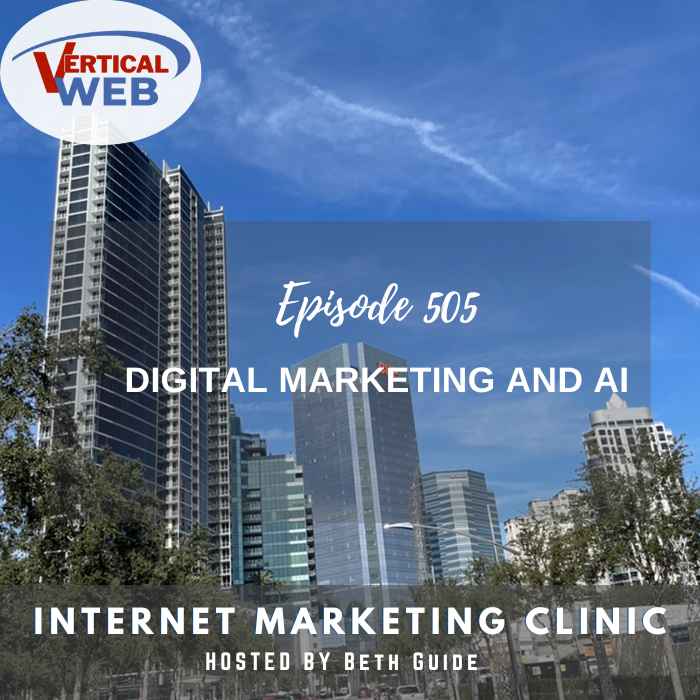



Subscribe to Our Podcast Apple Podcasts | RSS
As digital marketing continues to evolve, artificial intelligence has emerged as a powerful tool for website development and SEO optimization. In today’s video, we talk about how AI can streamline website creation, support SEO strategies, and save time on content generation.
Before diving into AI applications, we need to establish a fundamental point: platform choice matters significantly for SEO success. While many businesses are tempted by the simplicity of platforms like Wix, Weebly, Squarespace, or Shopify, these options often fall short of gaining solid SERPs.
“I’m very much about how we get traffic for people,” Beth explained, highlighting that WordPress (specifically wordpress.org, not wordpress.com) remains the superior choice for businesses serious about their online presence. This is particularly important for e-commerce sites, where Beth recommends WooCommerce over Shopify for better SEO performance. And although Shopify can be mofidified to perform, it us usually cost prohibitive to do so.
One of the most impressive demonstrations showed how AI can dramatically accelerate the website creation process. Using WordPress with the Astra theme and Spectra page builder, Beth demonstrated a near-complete dentist website built in roughly 20 minutes.
The process followed these steps:
This approach doesn’t eliminate the need for customization but creates a solid foundation that would typically take hours to build manually. As Beth notes, this is particularly valuable for those who find WordPress intimidating but need a professional-looking site with good SEO potential.
Perhaps the most valuable application of AI demonstrated was using it to determine optimal website structure and content strategy. Beth showed how asking Claude AI targeted questions about specific business types yields comprehensive outlines of recommended pages and services.
For example, when asked what pages a dentist in Kingwood should include for SEO purposes, Claude generated a detailed list including:
The AI didn’t stop there – it provided a breakdown of specific services that should be featured, essentially creating a content roadmap for the entire site. This same approach worked for other business types, including commercial real estate and translation services, demonstrating its versatility.
While Beth showcased AI’s power, she repeatedly emphasized a crucial point: “AI is thought-provoking, not thought-replacing.” This became particularly evident when examining keyword suggestions.
Using the “Keywords Everywhere” tool (a Chrome extension that shows monthly search volumes), Beth demonstrated how some AI-suggested terms have zero monthly searches, making them ineffective SEO targets. For instance, while Claude might suggest “property acquisition and sales” for a commercial real estate website, keyword research revealed that potential clients actually search for “buy commercial real estate” (10,000 monthly searches) or “sell commercial real estate” (1,600 monthly searches).
This validation process is essential for transforming AI suggestions into effective SEO strategy. As Beth explained, “I don’t want to see you go down an AI road and just give the AI answer just because it’s giving you the answer… It’s not smarter than you are.”
One particularly valuable insight involved using AI-generated service lists to create content depth. Rather than simply listing services on a single page, Beth recommended creating:
This approach creates natural keyword targeting opportunities while providing the content depth that search engines reward. For the dentist example, this strategy could generate 24+ pages of relevant content without straining for topics.
To demonstrate the versatility of this approach, Beth applied the same methodology to a translation and interpreting business. The AI immediately identified:
This real-world example showed how even business owners knowledgeable about their services can gain valuable insights about market demands and content organization through AI prompting.
Throughout the workshop, several best practices emerged for effectively integrating AI into website development and SEO:
AI’s potential for website development and SEO is still evolving. The key is finding the right balance between AI efficiency and human expertise.
The most successful implementation is using AI to handle repetitive, time-consuming tasks while applying human judgment to strategic decisions. This approach allows business owners to focus on what they do best while leveraging technology to enhance their digital presence.
For those looking to integrate AI into their website development and SEO strategy, Beth’s approach provides a practical framework: use AI to generate ideas and structure, validate with keyword research, apply industry knowledge to refine, and build content depth through strategic page hierarchy.
By following these principles, businesses of all sizes can harness the power of AI to improve their digital presence without sacrificing the personal expertise that makes their business unique.
Kingwood/Greater East Montgomery County/Spring April 23rd - In Person Register Today! Internet Marketing Minute NEW!… Read More
Kingwood/Greater East Montgomery County/Spring April 23rd - In Person Register Today! Internet Marketing Minute NEW!… Read More
HWCOC Classes Have Returned! New location to Better Serve You! April 16th - In Person… Read More
Kingwood/Greater East Montgomery County/Spring April 23rd - In Person Register Today! Internet Marketing Minute NEW!… Read More
HWCOC Classes Have Returned! New location to Better Serve You! April 16th - In Person… Read More
HWCOC Classes Have Returned! New location to Better Serve You! April 16th - In Person… Read More